After a short train journey from Delhi and a relaxing night in Chandigarh we drove up into the Himalayas to the lushly forested Kullu Valley. Sitting beneath the Great Himalayan Range, the Kullu Valley is known as the “Valley of the Gods” and we watched processions of villagers shouldering gorgeously decorated palanquins transporting marigold-draped gods to village festivals, accompanied by musicians playing long brass horns and kettle drums. We spent three days acclimatizing in the valley, visiting ancient temples and rustic villages of houses of rough-hewn cedar logs with slate roofs. We hiked through forests of giant cedar, locally known as “Devdar,” tree of the gods, stretching our legs and lungs to get ready for the trekking to come. The charming former home of the Russian painter Nicholas Roerich is filled with his stunning watercolours of the Himalayas; it was a treat to see them in this wonderful spot overlooking the valley with its terraced rice fields.
Leaving the Kullu Valley, we drove across the Pir Panjal Range over the magnificent Rohtang Pass (13,050 feet) and entered Lahaul, a land of mountains, glaciers, mighty waterfalls and rushing streams, Tibetan Buddhist monasteries and Hindu temples and prosperous villages growing hops and potatoes. We spent the night in an excellent mountain lodge in the small village of Jispa and next day, now in the heart of the Himalayas, drove across the mighty Baralacha La Pass (16,278 feet). That afternoon we reached our first campsite at Pang (15,695 feet) and met our crew, horsemen and horses. We would be a self-sufficient group for the next fifteen days. Our horses carried all luggage and supplies; we carried only light daypacks with water bottles and light jackets. Our wonderful local crew set up camp and prepared delicious meals, including fresh veggies and fruit. We ate and lounged in a roomy round dining tent. Lunch and treats were distributed along the trail. A great touch was a daily wake-up hot beverage delivered to our Gortex tents with a cheery “good morning.”
We set off along the river valley of the Phirtse Phu into the high-altitude lake region of the Changthang Plateau in Eastern Ladakh. Beautiful pinnacle formations, called hoodoos, lined the valley. The next day we continued walking along the river and the following day crossed our first pass at 16,250 feet with the 23,000-foot high snow peaks of Tibet lining the horizon. Along the way we met maroon-robed Changpa nomad men and women on sturdy, beautifully decorated mountain ponies. We camped near the large, brown yak wool tents of the Changpas, yak tail standards protecting them from evil spirits, and visited with them, sharing cups of butter tea and tsampa, roasted barley flour. The Changpas were very friendly and happy to talk with us and our local crew. They live tough but satisfying lives in this rugged terrain grazing vast flocks of pashmina goats, sheep and herds of yak on the rich grasses of the region which miraculously survive throughout the harsh winter.
We passed beautiful stone “mani” walls along our way, each stone a sacred offering carved with the mantra “Om Mane Padme Hum,” “The Jewel is in the Lotus,” the mantra of the Bodhisattva of Compassion, Avalokiteshvara, and arrived at Tso Moriri Lake, a huge remnant of the ancient Tethys Sea that existed before India collided with the Asian mainland pushing up the Himalayas. Surrounded by cream-colored mountains and lush meadows, the lake is a vast expanse of amazing blues. The colour of the lake changed throughout the day depending on the light; at times parts of it seemed to disappear as if “captured” by the reflections of the tan peaks behind it.
The area around the lake is home to kyang (the wild horse of the Changthang), wild goats, marmots, giant wild hares and a great variety of birds including bar-headed geese, brahminy ducks, gigantic “bearded” vultures, terns and the rare black necked crane. Groups of kyang cavorted on the shores of Tso Moriri Lake, and that evening, after the horses had had their fill of rich grass, our horsemen tethered them, knowing that the wild kyang might come in the night to lure their tame horses away.
Next day it was a beautiful walk along the lake. Some of us took a “refreshing” break, jumping into the clear, chill waters. At the northern edge of the lake we reached the village of Karzok, one of those frontier places that looked as if it is at the end of the world – which it is. The weathered Karzok gompa (monastery) looks over the lake, incongruous solar panels “gracing” its roof. In the Karzok village market traders sat behind great piles of pashmina wool and goods from China. Large colourfully decorated thermoses and warm fluffy blankets were bargained over by the villagers and nomads. A wonderful line of huge, ancient, weathered chortens to the side of the gompa overlooked the village. We visited Karzok Doksa, a vast meadow outside the village, where groups of nomads make camp for the summer.
Leaving Karzok, we ascended the Yalungnayu La, at 17,550 feet, the highest pass on the trek; we gazed back at the expanse of the lake and the snow peaks stretching to the horizon. At the top of the pass were piles of gigantic horns of Marco Polo sheep and innumerable strings of coloured prayer flags stamped with mantras emitting vibrations of peace and compassion to the world below as they flew in the winds.
Crossing a few lower passes, we reached Tso Kar Lake and village. Tso Kar is surrounded by deposits of pure white salt, and the wetlands around the lake harbour abundant bird life. Continuing through spectacular nomad country, we encountered huge herds of sheep, goats and yaks, saw innumerable marmots, camped in flower-filled meadows on the banks of crystal clear streams and passed many ancient stone watch towers before reaching our destination at Rumste. Here we met our SUVs for the three-hour drive to Leh (11,880 feet). The capital of Ladakh, Leh was a famed stop on the old caravan route between India and Tibet. We visited gompas, colourful bazaars and a Royal Palace said to be the inspiration for the Potala in Lhasa, and the world’s highest polo field. We explored the narrow alleyways of Muslim bakers and ate hot breads fresh from coal-fired tandoor ovens. We drove out of town on day trips to famed Alchi and Thiksey monasteries.
For more than a thousand years Tibetan Buddhist culture and religion have flourished in Ladakh. The remarkably well preserved thousand-year old Alchi temple complex stands amid a grove of ancient poplar trees. There are gorgeously painted statues – three stories high – of Bodhisattvas; the walls are covered with stunning paintings of divine figures and scenes of ancient life. The sprawling 16th-century Thiksey monastery covers an entire hill and contains a huge golden statue of Maitreya, the Buddha to come. The views from the monastery’s rooftop terrace over the Indus Valley were spectacular.
It was a short flight from Leh to Delhi over the moon-land landscape of Ladakh with grand views of snow-covered mountains and glaciers. In Delhi we toured New Delhi with its impressive buildings of the British Raj. We rode in cycle rickshaws in Old Delhi and wandered the narrow, winding lanes of its colorful bazaars, visiting temples and the great mosque built by Shah Jahan, the Mughal emperor who built the Taj Mahal.
|
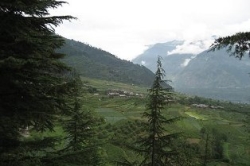
|
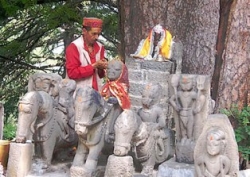
|
|
Picture (Carol & Martin Noval) : Kullu Valley
|
Picture (Carol & Martin Noval) : Local worship
|
Carol and Martin Noval live in India and have been trekking in the Himalayas for many years.
This summer they are leading another small-group trek into Changpa nomad country – 28 June to 23 July 2008. For more information email them at: tripsintoindia@usa.net and visit their website: www.tripsintoindia.com.

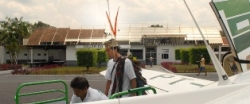
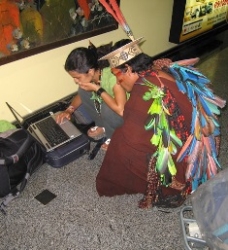


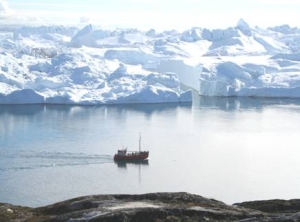


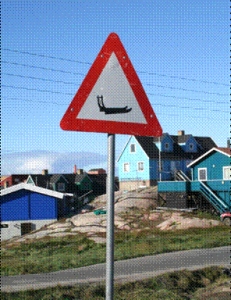
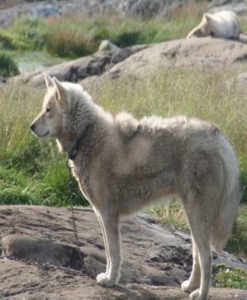
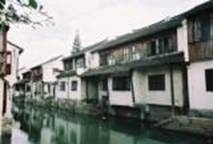
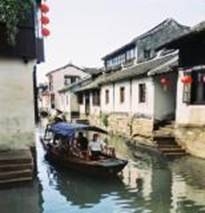
 Regular contributor Mac had some thoughts…
Regular contributor Mac had some thoughts…